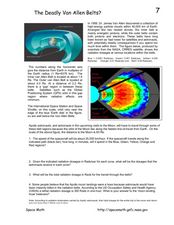Curated OER
LRO Sees Apollo 11 on the Moon!
In this moon image worksheet, students determine the scale of an image taken by the LRO satellite of the Apollo 11 landing site. Students calculate the sun's angle at the time of the photograph using the shadow of the Lunar Lading...
Curated OER
The Apollo-11 Landing Area at High-Resolution
In this moon crater learning exercise, students use images of craters taken from the Lunar Reconnaissance Orbiter to determine the size of the craters. This learning exercise has 6 problems to solve.
Curated OER
The Deadly Van Allen Belts?
In this Van Allen Belts worksheet, students read about the deadly affects of the high energy particle clouds located around the Earth. Students answer 4 questions about the dosages of radiation astronauts receive in the zones of the Van...
Curated OER
LRO Explores Lunar Surface Cratering
In this lunar surface activity, students use an image taken by the LRO satellite to investigate the size of craters on the moon's surface, to determine the crater density and to find the average distance between the craters.
Curated OER
Compound Interest
In this compound interest worksheet, students solve 3 problems after reading about compound interest. They determine the cost of the Apollo missions, they calculate inflation and the cost it would be to send man to the moon today and...
Curated OER
Mare Nubium and Las Vegas
In this satellite images learning exercise, students observe two photographs taken by the LRO Satellite of downtown Las Vegas and the moon. They solve 3 problems including determining the size of craters in the...
Curated OER
Not so Snappy 8-- Calendar and Space Related Problems
In this math and social studies worksheet, students recall the poem "Thirty days hath September..." Students solve 4 time and space-related problems using that calendar rhyme.
Curated OER
Probability Lines
In this math worksheet, students make estimates to consider the possibility of each event taking place from impossible to likely.
Curated OER
Galaxies and the Universe
If Earth was formed 4600 million years ago, and the sun revolves about the center of the Milky Way once every 250 million years, how many revolutions have occurred? Students answer this question and ten more, all providing students with...
Curated OER
Email From Another Planet
In this article about emails and plants worksheet, learners read short descriptions about 8 planets in the solar system and then imagine they are visiting one of the planets and send an email to a family member describing their...
Curated OER
LRO-Searching for Lunar Boulders
In this lunar boulders worksheet, students use an image taken by the LRO satellite of the surface of the moon to find the scale of the image and determine the number of boulders and their approximate sizes.
Curated OER
Problem-Solving Application: Making Predictions
In this problem-solving learning exercise, students learn how to make a prediction in problem-solving by using the 4 steps: understand, plan, solve and look back. They then use this problem-solving skill to answer 4 questions.
K12 Reader
Galileo and His Telescope
Learn about Galileo Galilei's contribution to modern science with a reading passage that focuses on reading comprehension. After kids read several paragraphs about his life, they answer five questions about the information they have just...
K12 Reader
Galileo and His Telescope
Readers are asked to identify how a key detail reveals the main idea of a paragraph about Galileo.
K5 Learning
Why Does the Ocean have Waves?
Six short answer questions challenge scholars to show what they know after reading an informational text that examines waves—what they are, what causes them, and how different Earth factors affect their size and strength.
















